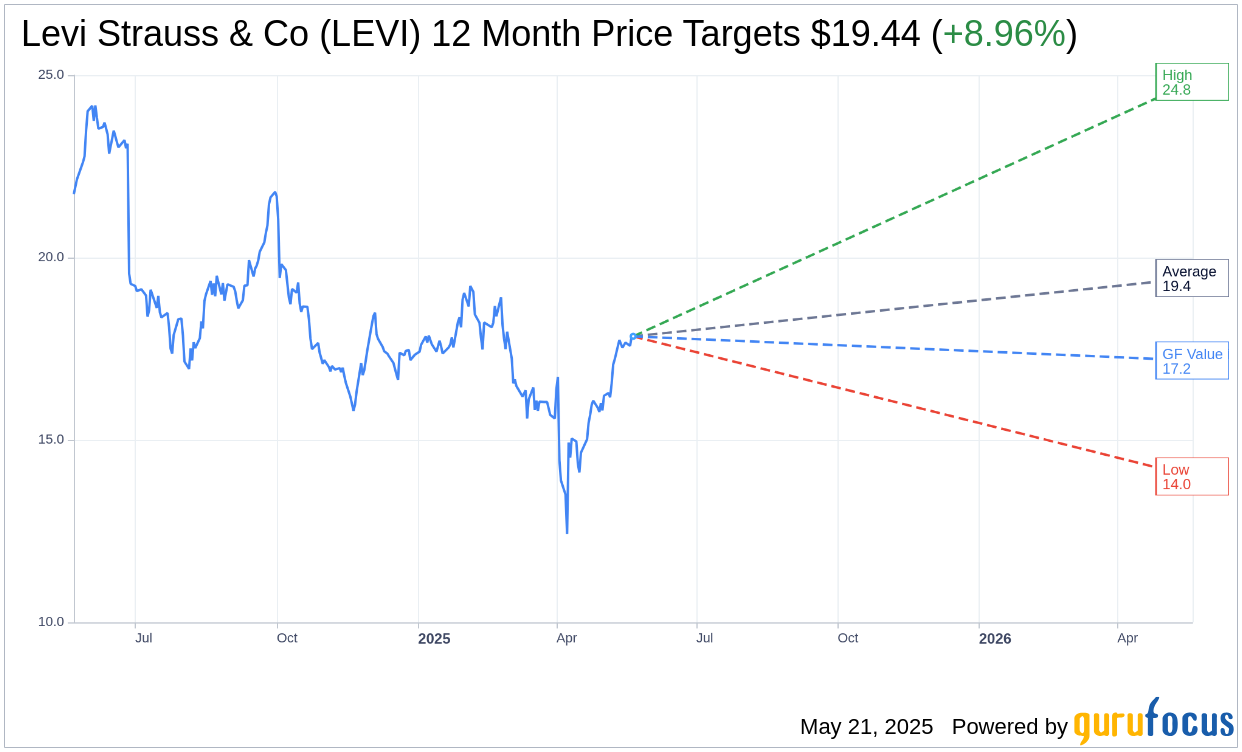Citi has raised its price target for Levi Strauss (LEVI, Financial) to $19, up from a previous target of $14, while maintaining a Neutral rating. This upgrade follows Levi Strauss's announcement of an agreement to sell its Dockers brand to Authentic Brands Group for $311 million, with the potential for an additional $80 million contingent on an earnout provision. The analyst noted that the sale of Dockers was anticipated, yet remains a positive move, and remarked that the sale price appears fair.
Wall Street Analysts Forecast

Based on the one-year price targets offered by 11 analysts, the average target price for Levi Strauss & Co (LEVI, Financial) is $19.44 with a high estimate of $24.82 and a low estimate of $14.00. The average target implies an upside of 8.96% from the current price of $17.84. More detailed estimate data can be found on the Levi Strauss & Co (LEVI) Forecast page.
Based on the consensus recommendation from 12 brokerage firms, Levi Strauss & Co's (LEVI, Financial) average brokerage recommendation is currently 2.1, indicating "Outperform" status. The rating scale ranges from 1 to 5, where 1 signifies Strong Buy, and 5 denotes Sell.
Based on GuruFocus estimates, the estimated GF Value for Levi Strauss & Co (LEVI, Financial) in one year is $17.18, suggesting a downside of 3.7% from the current price of $17.84. GF Value is GuruFocus' estimate of the fair value that the stock should be traded at. It is calculated based on the historical multiples the stock has traded at previously, as well as past business growth and the future estimates of the business' performance. More detailed data can be found on the Levi Strauss & Co (LEVI) Summary page.
LEVI Key Business Developments
Release Date: April 07, 2025
- Organic Net Revenue Growth: Up 9% in Q1.
- Direct-to-Consumer Growth: Up 12%, with positive comp growth and strong e-commerce performance.
- Wholesale Growth: Up 5%, with US business up 8% and international up 9%.
- Gross Margin: Record 62.1%, up 330 basis points from last year.
- Adjusted EBIT Margin: Expanded 400 basis points to 13.4%.
- Adjusted SG&A Expenses: Up 2% to $744 million.
- Adjusted Diluted EPS: $0.38, up 52% from prior year.
- Inventory Levels: Reported inventory dollars up 7% from prior year.
- Store Closures: Closed 21 net stores, including 51 underperforming franchisee stores in China.
- Dividend: Declared $0.13 per share, an increase of 8% from prior year.
- Americas Net Revenue: Up 11%, with US up 8%.
- Europe Net Revenue: Up 3%, with strong growth in the UK and Germany.
- Asia Net Revenue: Up 10%, with direct-to-consumer up 14%.
For the complete transcript of the earnings call, please refer to the full earnings call transcript.
Positive Points
- Levi Strauss & Co (LEVI, Financial) reported a strong start to 2025 with high single-digit organic net revenue growth of 9%.
- The direct-to-consumer (DTC) channel continues to be a primary growth driver, up 12%, with strong e-commerce performance.
- The company's wholesale business also showed positive growth, up 5%, with the US business accelerating by 8%.
- Levi Strauss & Co (LEVI) gained market share in both men's and women's categories, solidifying its number one position in denim.
- The company achieved record gross margins of 62.1%, driven by lower product costs, favorable channel and brand mix, and higher full-price selling.
Negative Points
- The company is facing a dynamic macro environment due to recent tariff announcements, which could impact future financial performance.
- Despite strong performance, the company remains cautious about global wholesale, expecting it to be flat for the full year on an organic basis.
- Levi Strauss & Co (LEVI) is dealing with challenges in its China market, which was flat compared to the prior year.
- The company closed 21 net stores in the quarter, including 51 underperforming franchisee stores in China.
- There is uncertainty regarding the impact of tariffs on the company's cost structure and pricing strategy, with potential implications for margins.
